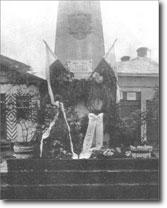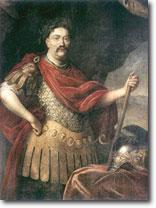| Monument
to King Jan Sobieski (1629-1696)
A 6-8 m tall obelisk honouring the former
Polish King Jan Sobieski ranks second only to Lenin’s
statue as one of Tovste’s famous ‘invisible’
monuments. The obelisk pictured here, guarded by a Polish
soldier, was situated alongside the main road, Ukrainska
Str. just north of the Roman Catholic church.
It was erected in 1933 in honour of the 250th anniversary
of Sobieski’s brilliant military victory over
the Turks at the Kahlenberg, near Vienna, on 12 September
1683, said to be one of the decisive battles of European
history. |
|

|
Jan Sobieski was born into lesser nobility and rose through
the ranks to become field commander of the Polish army in 1666.
In spring 1668, a further victory over the Turks and Cossacks
near Podhajce (Podhayits in modern Ukraine), about 65 km northwest
of Tluste, assured him of the title of commander in chief when
he returned triumphantly to Warsaw.
 |
|
Successive military victories only enhanced
his reputation and, in 1674, he was elected king. In 1683,
he concluded a treaty with the Holy Roman emperor Leopold
I against the Turks, under the terms of which each ally
had to support the other if the other's capital were to
be besieged. When a great Turkish army approached Vienna
late in the summer of 1683, Sobieski himself rushed there
with about 25,000 men. He took personal command of the
entire relief force of about 75,000 men, and secured the
victory that came be honoured in Tluste 250 years later. |
The Bolsheviks pulled down the monument to Sobieski around
1948-49 and buried it under what is today the sidewalk running
alongside the street. Though it can no longer be seen, a slight
rise in the pavement gives evidence of its existence. Although
suggestions have been made in the past to excavate it, nothing
has come to pass for lack of funds.
Sources:
Encyclopedia Britannica, 2003
Pawlyk, J. pers. comm. 
|

